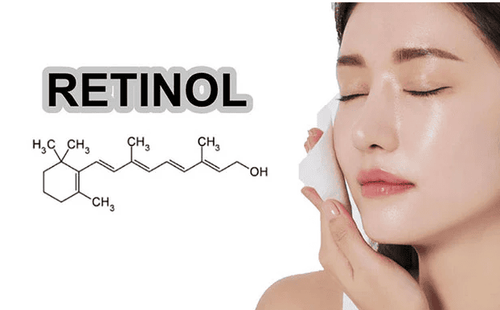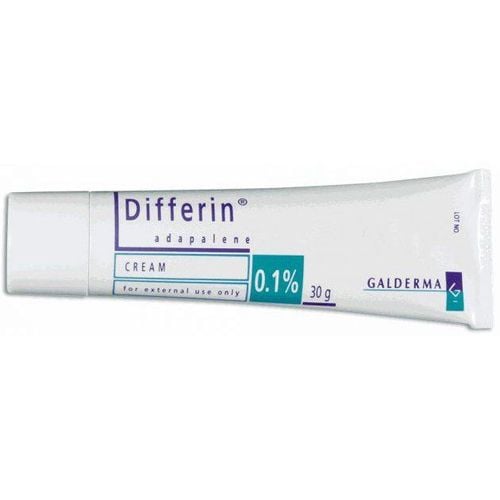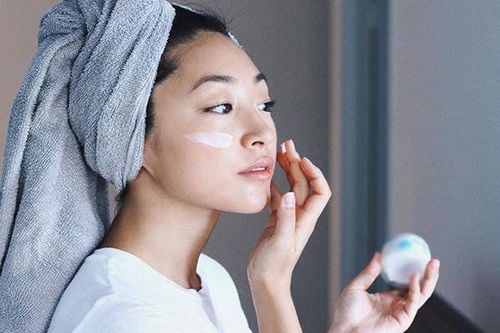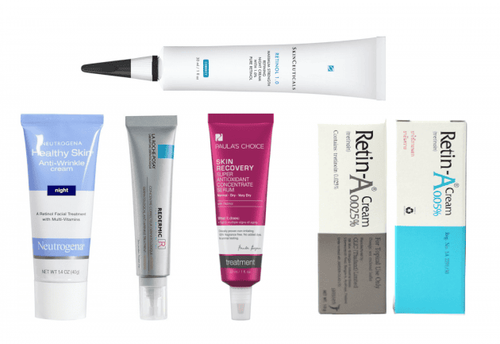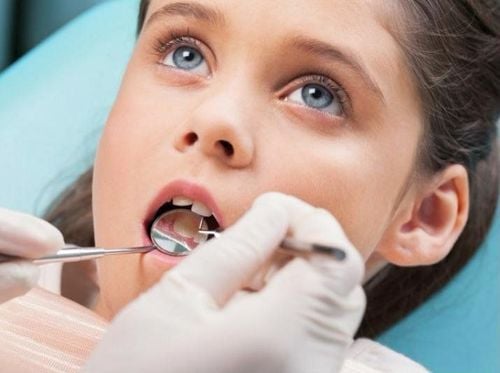This is an automatically translated article.
Acne-fighting retinol is a natural vitamin A derivative commonly used in anti-aging creams, but it's also an effective ingredient for treating acne and reducing the appearance of acne scars.1. Does retinol treat acne?
Acne-fighting retinol is a common ingredient in over-the-counter (OTC) skin care products such as serums, anti-wrinkle creams, and overnight moisturizers. It is part of a group of compounds known as retinoids. Although all retinoids come from vitamin A, their properties are different.Acne-fighting retinol works a number of different ways in different areas of the skin.
In the outermost layer of skin (epidermis), retinol exfoliates to remove dirt, dead skin cells, and oil from pores. This can help prevent acne formation. Unlike many other acne treatments, retinol stays under your skin as well. Microscopic molecules penetrate the middle layer of the skin (dermis), stimulating the production of collagen and elastin. Both of these compounds work indirectly against acne by reducing the appearance of pores and acne scarring over time.
2. What is the difference between retinol and retinoids?
Retinol and retinoids are chemically similar. They are also used to treat similar skin conditions. However, there are a few important differences. Acne-repelling retinol is a type of retinoids. Other popular retinoids include:Adapalene (Differin); Tretinoin (Retin-A); Isotretinoin (Accutane); Retinoid esters (retinyl palmitate, retinyl acetate, retinyl linoleate). Acne-fighting retinoids are a medium strength retinoid. It is more potent than retinoid esters but weaker than tretinoin or isotretinoin, and should only be used with a doctor's prescription.
That means that while the results of using retinol may not be as quick or dramatic as those with products containing tretinoin or isotretinoin, it has a lower risk of side effects, it is less irritating to the skin.
The availability of acne retinol also makes it a good place to start if you want to try acne retinoids.
3. What is the most effective retinol dosage to treat acne?
Over-the-counter retinol creams, gels, and serums typically contain between 0.25 and 1.5% retinol. The concentration you need will largely depend on your skin type.If you have sensitive skin, start with a lower dosage. If you do not experience side effects, you can increase the dose later.
Also, keep in mind that anti-aging products with retinol may not be formulated to treat acne. You'll want to avoid ingredients that can aggravate acne, such as perfumes and oils.
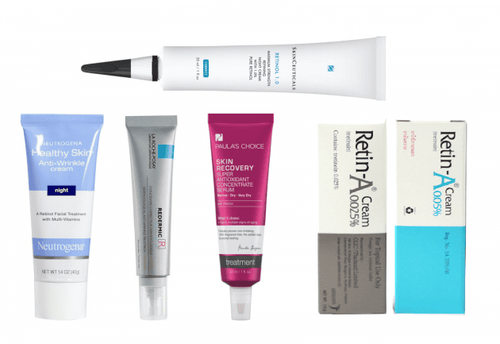
Kem, gel và serum retinol không kê đơn retinol thường chứa từ 0,25 đến 1,5% retinol
4. How to use retinol for acne
When trying a retinol product, it's important to follow the product's directions for use and proceed gradually. It may cause some redness or irritation at first until your skin adapts to the retinol.First, start by adding the product to your skin care routine one night per week. If you do not notice side effects, you can apply it more often.
To reduce the risk of irritation, wash your face and wait half an hour before applying retinol. Retinol is best used at night, as it can increase your skin's sensitivity to the sun. When you go out, remember to use sunscreen to protect your face.
Also, remember that you don't need to use retinol every day for it to be effective for acne. 2 to 3 times per week may be enough. You should continue to use it even if you begin to notice an improvement in your acne.
5. Does retinol have side effects?
Retinol is a natural form of vitamin A, but that doesn't mean it's free of side effects. Some potential side effects include:Dry skin; Stimulate; Itchy; Skin peeling; Redness of the skin; Skin is sensitive to the sun. These effects are more likely to occur when you first start using retinol. They should subside after a few weeks as your skin adapts to the product. However, if side effects persist, you may want to switch to a product with a lower concentration.
Retinol may trigger or worsen rashes in people with eczema.
Also, it's not safe for pregnant women. Talk to your doctor about using retinol if you're thinking about becoming pregnant in the near future. Finally, long-term retinol use may pose additional risks
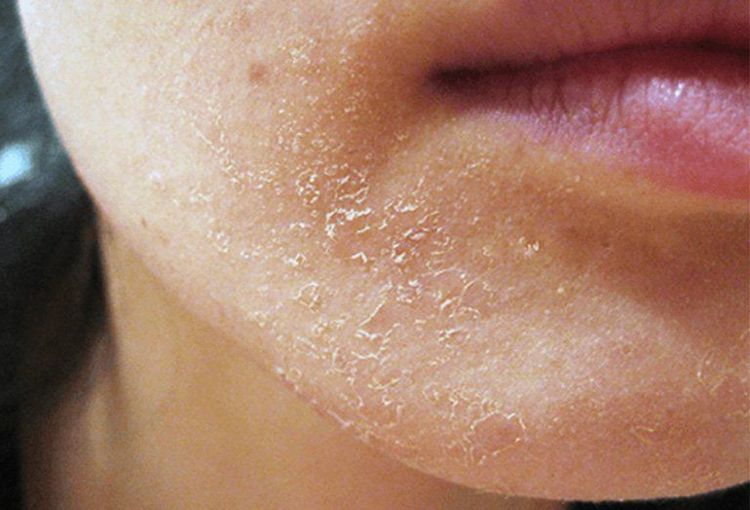
Bong tróc da là một trong số những tác dụng phụ có thể gặp phải khi sử dụng Retinol
6. Can retinol help with other skin problems?
In addition to helping with acne, retinol can be used to treat a number of other skin conditions, including:Wrinkles; Sun damage; Uneven skin tone or dullness; Melasma ; Hyperpigmentation; Large pores; Oily skin. Remember that to start seeing the benefits of retinol, you need to use it regularly. It can take up to 2 to 3 months to see results.
7. Other remedies to help reduce acne
7.1. Wash your face the right way To help prevent breakouts, it's important to remove excess oil, dirt, and sweat from your face on a daily basis. However, washing your face more than twice a day can make your acne worse. Do not wash your face with harsh detergents that dry out the skin. It is recommended to use alcohol-free cleanser7.2. Moisturize the skin Moisturizer keeps the skin hydrated. However, many moisturizers contain oils, synthetic fragrances, or other ingredients that can cause skin irritation and breakouts.
To help prevent pimples, use a fragrance-free, hypoallergenic moisturizer.
7.3. Drink enough water When you're dehydrated, your body signals your skin's oil glands to produce more oil. Dehydration also makes your skin dull and promotes inflammation and redness.
To keep the body hydrated, drink at least 8 glasses of water (each cup is equivalent to 240ml) every day. Drink more after you exercise, if you're pregnant or nursing, or you're in a hot, humid environment.
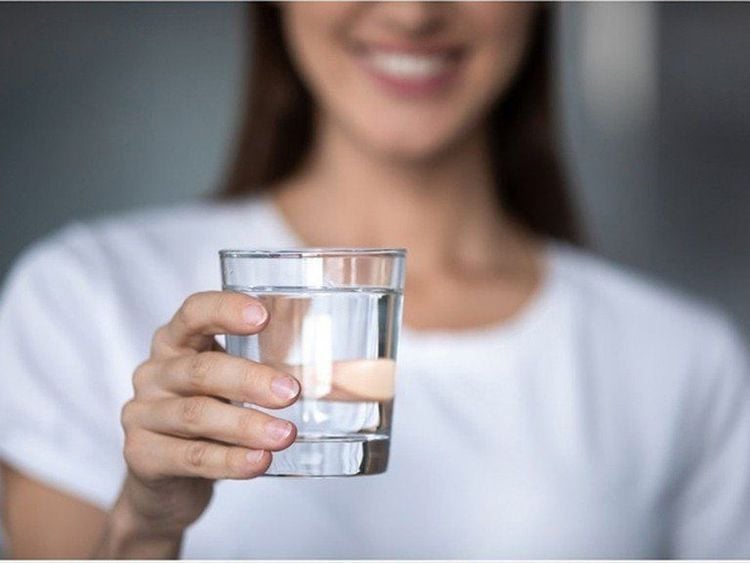
Để giữ cho cơ thể đủ nước, hãy uống ít nhất 8 cốc nước (mỗi cốc tương đương 240ml) mỗi ngày
Limit makeup when you can. When you wear makeup, avoid too greasy foundations, and use products that are hypoallergenic and fragrance-free.
Shampoo, body wash, shaving cream, and hair styling products can all cause breakouts. To help prevent breakouts, choose oil-free, hypoallergenic products.
7.5. Limit touching your face Your hands are often contaminated with dirt and bacteria continuously throughout the day. And every time you touch your face with your hands, dirt and bacteria can transfer to your face and clog pores, causing acne. Wash your hands often and try to touch your face as little as possible.
7.6. Limit sun exposure Sun exposure can dry out acne in the short term, but it causes major problems in the long run. Regular sun exposure causes the skin to lose water, which over time causes the skin to produce more oil and clog pores.
7.7. Reduce stress Stress doesn't cause acne, but it can make them worse. According to the American Academy of Dermatology, research has shown that when you are stressed, your body produces more hormones that stimulate oil secretion.
Some ways to help you manage stress are:
Yoga; Meditation; Write diary; Massage. Retinol is an ingredient commonly found in anti-aging creams, gels, and serums. What many people don't know is that it can also be used to treat acne and acne-scarred skin. It works in both the surface and middle layers of the skin to unclog pores, fade scars, and improve tone and texture.
If you are considering trying a retinol for the first time, be aware that it can cause side effects including irritation. Most of these side effects go away after a few weeks of use. Talk to your doctor or a dermatologist to learn more about using retinol for acne.
Please dial HOTLINE for more information or register for an appointment HERE. Download MyVinmec app to make appointments faster and to manage your bookings easily.
Reference source: healthline.com



